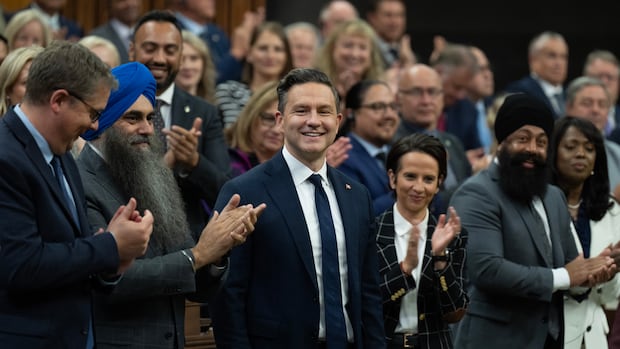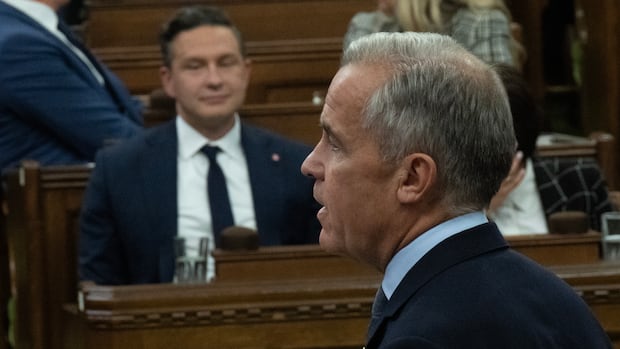Pierre Poilievre was back in his happy place. Mark Carney was back in the prime minister’s seat. Between them lay 396 centimetres of green carpet and the future of the country.
“Why is it that all of this prime minister’s promises of yesterday turn into today’s disappointments?” the Conservative leader asked.
“We need to be clear about the scale of the crisis we are in,” the prime minister responded.
For a brief moment, just before question period, the two leaders met in the middle. Both arriving to the House of Commons just before the appointed time for question period, they strayed from their assigned sides into the centre aisle, shook hands and greeted each other. The discussion appeared entirely civil.
What followed was their first parliamentary meeting — delayed several months by the fact that a majority of voters of the Ottawa-area riding of Carleton chose someone other than Poilievre to represent them. Freshly elected by the people of Battle River-Crowfoot in Alberta, Poilievre stood in the House on Monday afternoon and jokingly apologized for his late arrival to the parliamentary session.
Among the various points of differentiation between those two leaders is the demonstrable fact that Poilievre is quite comfortable on the floor of the House and Carney is still finding his footing. Poilievre joked and poked and delivered his lines with ease, as if he’d never left. Carney, just five months into his life as an MP, had the air of someone who still finds novelty in being there — laughing at his own stumbles, getting distracted by the heckles, running out of time to deliver his responses.
There is probably something to be said for not immediately seeming too comfortable amid the high dudgeon and low-level noise of question period — most humans wouldn’t be. But for as long as he will be obligated to periodically attend, Carney will want to figure out how to make the best use of that time.
Their first confrontation across those 396 centimetres was predictably tentative and scattershot. The opening rounds of most fights typically are. But the initial terms of engagement were set — Poilievre chasing the idea that Carney has failed to meaningfully change anything, Carney chasing the idea that he is responding decisively to a profoundly challenging moment.
The daily airing of grievances and the future of Canada
Since 1867, there have been 49 leaders of the Opposition and 24 prime ministers (close readers will note that the rate of turnover is twice as high on the Opposition side). Each has been a leading participant in a grand debate about the nation. But perhaps only some have done so at a moment as fraught as this.
Every Parliament faces its share of crises. But surely few have faced a set of problems of the shape and scope that now confront this Parliament, the 45th since Confederation.
The behemoth to our south is slipping further and further into dysfunction. American tariffs are dragging down the Canadian economy. Housing in Canada remains painfully unaffordable. The world seems to grow only more combustible. The planet continues to burn.
Prime Minister Mark Carney welcomes Leader of the Opposition Pierre Poilievre back to the House of Commons on Monday afternoon following the Conservative leader’s byelection win in August.
All of these concerns will come to pass, in some form or another, through this chamber — in words and in action or in the distinct lack thereof. And each afternoon — except for Fridays, when the airing of grievances occurs in the morning — there will be the customary 45 minutes reserved for “oral questions.”
Question period is a meaningful exercise in accountability — a revealing stage for both government and opposition. It is also a theatre — a well-lit and handsomely appointed sound stage for recording bits of video that can be pushed out on social media for likes and retweets. The pretense of actual questions and actual answers sometimes seems barely to hold.
At times such as these it might be tempting to ask that the House of Commons and its 343 members rise to the occasion — that they might meet the moment with reason, civility, eloquence, openness and erudition. Possibly that is too much to ask, or at least to expect. But the 45th Parliament might nonetheless find a way to productively muddle through somehow.
Prime Minister Mark Carney and Leader of the Opposition Pierre Poilievre faced off during question period for the first time on Monday afternoon. Poilievre, returning to the House after an August byelection, suggested that Carney hadn’t been keeping his promises, which Carney rejected.
More than anything, what is unfolding in the United States has exposed the basic fragility of any democratic system and how little can truly be taken for granted. Not that a democracy is easily undone, but that it is reinforced and maintained and preserved only by the efforts of its participants.
Whatever else they do, the members of the 45th Parliament might at least keep that in mind.
Walking past reporters after question period on Monday, Carney remarked that the day’s back-and-forth had been “very informative.”
For the first day of the fall sitting of the 45th Parliament, that was good enough.









